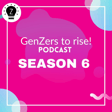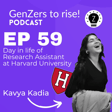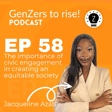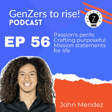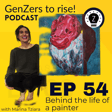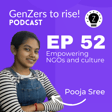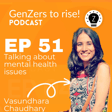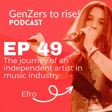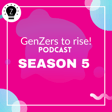Become a Creator today!Start creating today - Share your story with the world!
Start for free
00:00:00
00:00:01

Wildlife photography explained with Mateusz Piesiak
In this episode we are talking with Mateusz Piesak @mpwildlife about the wildlife photography. Mateusz won the portfolio wildlife photographer of the year award and he shares tips, experiences and background knowledge. We also discuss about career change path and amazing upcoming photography projects.
You can connect with Mateusz at https://lnkfi.re/mpwildlife
Follow GenZers to rise! https://go.changemakerz.org/follow
Episode's page https://podcast.changemakerz.org/mpwildlife
Access exclusive content on the ChangemakerZ app at https://app.changemakerz.org
Produced by Vasilis Skarleas
Transcript
Introduction and Changemaker-Z Initiative
00:00:01
Speaker
Hello everyone, I'm Kennedy. And I'm Vassilis. We run Changemaker-Z, a student-run initiative that aims to empower, educate, and connect Gen Zers interested in entrepreneurship. We interview teenagers with impactful projects and create resources to help you change the world. If they can't do it, so can he.
00:00:23
Speaker
On this podcast, we discuss the logistics of creating different types of projects with Jin Ziers who have already done it. We will leave our social media and website information in the description.
00:00:45
Speaker
Welcome
Meet Mateus Piazak: Wildlife Photographer
00:00:46
Speaker
everyone to a brand new episode of the Dancer Tries Podcast. I'm so excited for today's episode since we passed from the studio is Mateus Piazak. The rising portfolio awarded for wildlife photography competition for 2022 and Mateus graduated in automatics and robotics at the University of Science and Technology but works as a website designer and professional photographer. Mateus, welcome to the show, so nice to meet you.
00:01:15
Speaker
Yeah, nice to meet you too. Thank you for inviting me to your podcast. Thank you so much for being with us today. So I have done so many different things until today. And like I really admire what you're doing. You're doing photography, you're doing websites. You have done science in the past.
Photography Passion and Self-Learning Journey
00:01:36
Speaker
So my first question is how did you get started with photography? What was your motivation behind it?
00:01:43
Speaker
So passion for nature was my first passion ever. So I used to go out every free moment after school or even before school and just to watch birds and other animals. And then I got a little camera to document my interesting observations.
00:02:05
Speaker
But then I got kind of addicted to the camera, so I wanted photos to be better and better. And I started reading about photography, learning from books, from the internet.
00:02:20
Speaker
So I quickly discovered I need a long lens and a better camera. And so, yeah, after a few years, I think I got one. And then, you know, it was it was really amazing for me so that I could document
00:02:40
Speaker
like different moments that I saw in the nature, like let's say at sunrise, the bird just took off and I could document this moment and show it to my parents, to my friends. So it was really nice. So I kept doing it and yeah, that's how it started. This is really amazing. Like you started as a beginner and you perfectionized your photography skills across the years.
00:03:08
Speaker
And then you were so passionate and wanted to keep doing that, sharing with the world what you were doing with your audience. It's just an example, a great example of how people are passionate about what they're doing. Many times I woke up at 3 or 4 AM, then I went with the first bus to the local park or to the forest.
00:03:33
Speaker
You can capture the best image. Yes, at sunrise. And then I still came back for 8am to be present at school. And I kept doing it like every day, usually. So it was pretty demanding. So this became literally your parallel life. Yeah, exactly. Exactly. So I had kind of two different lives. I love this. I love this. So amazing.
Challenges in Wildlife Photography
00:03:59
Speaker
Which are the challenges of being a wildlife photographer?
00:04:03
Speaker
Oh yeah, there are a lot of difficulties in being a wildlife photographer, because this is kind of a tricky type of photography, because let's say when you photograph humans or landscapes, they don't run away from you. But when you want to photograph animals,
00:04:25
Speaker
they do run away from you. So you have to know your camera perfectly but you also have to know how to hide, how to approach wildlife and animals so you can get close enough for a good photo. So I would say you have to be really really patient because many times I have to sit
00:04:48
Speaker
six, eight hours in one place covered with a camouflage net or just hiding in a little shelter in the bushes, you know, just to be invisible for animals. And many times they don't come. So I come home without any photo. But then after, like, let's say one week of waiting in one place,
00:05:11
Speaker
when I finally have my shot then it's really rewarding and you know I'm happy I was patient enough to photograph it. At least I imagine even if you didn't have you know the photo one day you had an amazing experience trying to capture this photo. Yes exactly because when I'm sitting
00:05:36
Speaker
let's say at the pond, at sunrise, I'm usually the only human out there. There's only me and wildlife. So you have the chance to hear all those amazing voices and sounds of nature. And often animals have no idea that I'm there, so they come really close. And that's the really amazing experience that I'm happy I can document and show to other people.
Turning Passion into Career
00:06:05
Speaker
Would you say that photography was a career change from your studies in Automatics and Robotics?
00:06:12
Speaker
So my photography journey was always I would say the second path because my mind was always like always go to the university to have the degree in like science or maths but photography was like a passion from my heart
00:06:36
Speaker
But as I got a few awards in competitions and my photos got discovered by others, I got some occasions to work as a photographer. And since a few years, this changed. So I can say like,
00:06:55
Speaker
Now this is my main work, which is great because this is also my passion. So it's, I think it's, it's, it's nice, really nice to, to have the passion and the work, which is the same thing because then you can work all day and you are not, you know, tired of it because you would do it anyway. Yes. Like you have to be passionate about what you're doing because of your notes in the end.
00:07:21
Speaker
You won't, you will start disliking what you're doing. You won't find the motivation in your life and you won't be successful to what you're doing. Exactly. Yes, exactly. So
Photo Selection and Editing Philosophy
00:07:35
Speaker
let's consider that you have captured an image in the forest with an animal. Which are the steps of editing this image? So
00:07:50
Speaker
I often take a lot of photos because I want to capture the perfect moment. Let's say when the bird starts or takes off, I want to have the perfect frame with the wings spread.
00:08:06
Speaker
And so I come home with thousands of photos. So the first process is to select the best ones, which takes a lot of time. But I want to make sure that I chose the most sharp image and with the best pose. So when I have the
00:08:26
Speaker
like the selected image, then I crop it if needed. I open it in Lightroom or Photoshop. I add some contrast and do the basic addition, but you know I don't want to over edit the photo.
00:08:42
Speaker
I prefer to spend more time in the field waiting for the perfect sunrise or the misty mornings than I added it to in Photoshop. So when I edit my photos, I always try to go to them, like to show them the view that I saw in the field so that it's the most natural scene I observed.
00:09:08
Speaker
So yeah, when I edit my photo and I save it and publish it in the internet. This is really amazing. So I was wondering, what makes an image stand out based on your personal experience? Like, why do you think that image is more preferable than other images from across, you know, all the images that exist online and people are discovering your work?
00:09:36
Speaker
I think perspective is really important in wildlife photography. If you photograph from the eye level of the animal, you can blur the background and the foreground, leaving only the animal sharp in the frame. So when, let's say, a bird walks in the mud or in like...
00:09:59
Speaker
streams in the water. You also
Wildlife Photography Techniques
00:10:02
Speaker
have to be as low as possible to get the best result. But if, let's say, a squirrel sits in a tree high above the ground, you also have to find yourself on that tree. I used to bring colliders to the cemeteries to photograph owls, which was pretty funny. But at the end, I got the nice shot.
00:10:27
Speaker
So yeah, the angle of view is really important and also light. Usually the best light for photography is at sunrise or at sunset. But I would also say the harder the conditions are, let's say the, I don't know, snowstorm or the heavy rain, the better the photos turned out because those conditions are kind of difficult and pretty rare to photograph in.
00:10:57
Speaker
But when you take a photo in those conditions, it stands out from the crowd, which is more likely to be the good shot. So yeah, the composition, the light, the perspective. And I would also say in wildlife photography, it's really important.
00:11:14
Speaker
because you know it's easy to take a photo but it's not easy to find yourself in the place close to the animal that allows you to take the photo. So in wildlife photography the knowledge about the animals is like the most important thing. Usually when I take the photo it's just one moment but
00:11:38
Speaker
days, hours, days, even weeks before this, I spend in the field just only observing birds, animals, learning where they are. Yeah, preparation is really, really important. Without preparation, you know, you can be lucky, you can take one photo or two, but without preparation, you know, it's really, really important.
00:12:00
Speaker
I understand what you're saying. Like you want to scan the field to see where you can take the best perspective to see from where the light is coming from and start imagining where you're going to position yourself in order to capture the image. Like exactly a cinematographer would do to capture a video. But in this scenario we have animals that they do not cooperate. You will stand there and then I will capture this thing and we will repeat it.
00:12:29
Speaker
As many times, it's needed. Yes. So when I find a place, I then build a hide, like a little shelter from the trees or the, I don't know, the camouflage net. And then I go there before the sunrise and wait as long as needed.
00:12:49
Speaker
so from that moment it's just a waiting game because animals are wild and you know you can't really tell the bird to go here or go there you just have to wait in silence and sometimes they come and sometimes they not so then you have to be really patient but patient but in the end when they come you have the photo
00:13:14
Speaker
Congratulations for being awarded at the Rising Star Portfolio category for Wildlife Photography of the Year 2022, event by the National History Museum of London. How do you felt about this accomplishment?
Rising Star Portfolio Award
00:13:29
Speaker
Thank you so much. I'm really happy that I got this award because, I mean, that's the biggest award I've ever gotten, so it's really important for me. Thank you.
00:13:47
Speaker
I really like this award because this is not a word for one photo, but for the whole portfolio, which means you have to show judges a series of your photos. So I think it's much harder because those photos have to be coincident and like to match each other.
00:14:13
Speaker
And yeah, I like this competition because this was the first competition 10 years ago that I won. I was really small, I was really little back then and I didn't really spoke English back then. And I remember
00:14:35
Speaker
I got an email from the UK saying that one of my photos was awarded in this competition, the YAF category. And I was like, no, that must be a spam, the junk email. So I deleted it.
00:14:51
Speaker
Yeah, and I didn't even tell my parents or anyone. But two weeks later, I got another email saying, oh, we invite you to award ceremony in London. And I was like, oh, wait, maybe that wasn't a junk email. So I showed it to my parents and they were like, oh, this seems legit. This is real.
00:15:10
Speaker
Yeah, so two months later, we flew to London to the National History Museum of London. And yeah, that was huge because I didn't even know what the competition was, to be honest. And it turned out to be the greatest competition of wildlife photography in the world. And yeah, so it was a huge honor for me to be there. And I'm really happy to be back this year.
00:15:41
Speaker
This is really, I don't know, this is challenging for someone who's trying to find, to be assured that one way the work he's doing, even if it's in photography, with casting videos, whoever is the industry, the work that he's doing is going to be somehow awarded, not by any competition, but even the audience or the world. The world is going to find out the media
00:16:10
Speaker
And if they like what they're saying, they will be literally become the fans, engaged audience.
00:16:19
Speaker
And yeah, I don't know if this is for you, but for me, it's really inspiring when I got even one comment saying, oh, I like this photo. It's really inspiring for me because I'm happy that my work is being liked by someone. And yeah, that just gives a huge motivation to just keep going on.
00:16:43
Speaker
Keep going, yeah. It's like when you understand that your work is being discovered by others and by the time you hadn't realized that you have impacted someone's life somehow. Like when you're seeing a photo, you're feeling some motion. So you're trying to find out how he captured this image, what's their, these are the emotions that they have been provoked. It's the same for the podcast as a podcaster and producer when I'm seeing, you know, the stats.
00:17:13
Speaker
trying to understand what type of forecast episodes I need to bring to the audience next. And then I'm saying, oh, wow, I have 20K listens in two years saying, oh, that means that I have 10K listens per year. And you're receiving awards from Spotify or you're receiving offers from companies that they want to be advertised on. So say, wait a minute.
00:17:39
Speaker
something is here, someone is like what I'm doing, this keeps me motivated and at the same time I'm impacting people's lives and at the same time I'm feeling inspired and I have the motivation to keep doing that and I think that this is really the most satisfying thing that someone can feel. Yeah, exactly.
00:18:06
Speaker
How was the process of competing with so many other photographers in the same category? And what did the experience look like with your trip in London this year? So
Inspiration from Award Ceremony Experience
00:18:18
Speaker
the trip to London and the awards ceremony was really, really inspiring because, you know, the award is one thing, but to be able to talk to other photographers, to attend this ceremony and to
00:18:35
Speaker
to see the, you know, like the legends of wildlife photography in one place from all over the world. It's really inspiring. And I think this is the most rewarding thing in the whole competition, just to, you know, to be able to talk to those people. The connections that you're creating, like you don't have the photographers, you're inspired from them.
00:19:03
Speaker
and maybe you have only read about them, you have seen their work and here you have the chance to meet them in person and you discuss things about photos or even to become friends
00:19:17
Speaker
Yes, I've met a few photographers from National Geographic or BBC Wildlife or Planet Earth. I used to watch those images and films in TV or Netflix and stuff like that. And now I have the possibility to talk to the authors of those works. This is really amazing.
00:19:45
Speaker
I was wondering, do you have a tremendous adventure while you were trying to capture the best photo that you would like to share with us?
00:19:59
Speaker
Yeah, so I have many funny stories and I can tell you one story that happened to me recently. I was trying to photograph a hopeful. This is I don't know if you probably you know this because this is a really common birth to friends or grace.
00:20:18
Speaker
It's called rupu, H-O-O-P-O-U probably. This is the bird with the punky eye ruckus on the top of it. So I built a hide near the place where I knew this rupu was flying or sitting.
00:20:36
Speaker
And it was near a barbed wire. You know, there was the area with grass, probably some, I don't know, the cows were there. And there was a barbed wire. So in order to hide myself, I built the hide under the tree, under the willow tree near the barbed wire.
00:21:02
Speaker
And from this spot, I could photograph the hupus really nicely. But it turned out, so I went to the high before the sunrise. I waited like three hours and I got the most amazing photos of hupus. But then it turned out that the tree that I was under was the only green tree on the whole area. And the farmer released
00:21:31
Speaker
a lot of cows to that area so when they saw the only tree that is green they all rushed on me and tried to you know eat the green branches of the tree and which resulted in you know the cows were all around me and were pushing me towards the barbed wire so it was really you know in that moment I
00:22:00
Speaker
I had two feelings. I was really happy because I took the photo of a hupu, but I was also really terrified because I was surrounded with cows and I couldn't escape really because from one side there were cows and from the other there was a barbed wire. So yeah. Oh, wow. This is really a tremendous story. I think this is crazy. And like when you're trying to capture, you know, the animals,
00:22:29
Speaker
Do you have done any research like you told us about a hupu, so you search that this bird is called hupu or like? So, yeah, before before photographing, I have to find a bird. So I have to, you know, scout the area with my binoculars and, you know, just just to observe it. And
00:22:56
Speaker
When I find a good place, then I think of where to build my hide and prepare myself. Let's move on to another subject. You also love to play piano.
Interconnection of Photography and Music
00:23:12
Speaker
Do you find a cross-section between music and photography? Like photography is one thing, music is another thing. Do you like to combine them? What do you think about that? Yeah, so I've been playing piano from a young kid. At the beginning, I didn't like it, but my parents kind of forced me to do it. But after some years, I really liked it and I kind of fell in love with it.
00:23:42
Speaker
So yeah, I've been playing piano for a long time and I think it's really similar. I mean, some of the music and the nature are really similar because many compositors and pianists
00:23:59
Speaker
took inspiration from singing birds, for example. So you can find a melodies in music that you can hear in nature. And so it's really similar. And yeah, I really like to combine those two passions one day, where I play the piano on stage and present my photos in the background.
00:24:24
Speaker
So I did a few of those presentations in the past and always people were really happy when they saw it and even were coming to me after it with the tears in their eyes. So for me as an artist this is like the biggest reward. Yeah I agree with you and I like the
00:24:49
Speaker
the way that you said that you are an artist, because you are an artist, you are an artist in photography and you are an artist in music, and I'm noticing that you will accomplish more times to combine this together, because I'm trying to imagine what you just explained, and I cannot say that this is so beautiful to be part of an event of this kind.
00:25:12
Speaker
How do you manage social media content and posts? We're talking about more than 500,000 followers on TikTok and 50,000 on Instagram. So how do you manage with all these, you know, funds and engagement on the platforms?
00:25:31
Speaker
uh so it's it's really hard to answer every comment every message because i would love to but sometimes there are so many that i can't really read them all which i'm really sorry for but it you know it's it's really um
00:25:52
Speaker
When I think of the numbers, it's crazy because I just want to share my photos and show them to other people, but it's also important to think of the impact that my photos can bring and to show other people. So it's also important to accept of nice photos, tell about the importance of, you know,
00:26:21
Speaker
of our planet's nature and that's what I also try to do, you know, to tell the stories of like, you know, don't leaving trash around and that kind of stuff, you know. Yeah, like you want to create, you know, to motivate people to be more sustainable or to follow other campaigns like environmental friendly, for instance.
00:26:51
Speaker
Yeah, because in a few years, if we don't take care of our planet, those animals that are present today may not be present in the future anymore. What are some of your upcoming projects or goals in the field of wildlife photography? So in January, I will be in Switzerland for one month trying to photograph Ibex.
00:27:18
Speaker
and some vultures. So I will be sleeping in a small cabin on the top of the mountain in the freezing winter conditions, trying to get the perfect shirt, but also to show the harsh environment that those animals live in.
00:27:38
Speaker
So those photos will be kind of more documenting the conditions and showing the species, like the small species in the winter conditions. So that's one plan. And also in 2023, I plan to host some workshops to Iceland, photography workshops. So that's kind of a more long distance plans. So last question.
00:28:08
Speaker
Is there anything else you would like to share with us today? I can say that from some time I started doing videos of nature because I got a better camera which allowed me to record in slow motion. And I got really into it because many times you can show more than just through photography.
00:28:31
Speaker
You can show some behaviors of animals that are impossible to capture with the stills footage. So yeah, it's really nice. So I got more into it. And I also tried to record a
00:28:49
Speaker
How do you say it? Like the videos from the background showing me in the field. In the past, I was always showing just the results, which were nice. And people were like, oh, this is nice, this is nice. But not many people realize what is the way to take this photo. And now,
00:29:11
Speaker
I try to kind of educate people how to do this photo, so I like to show the whole process, how I build the height, how I weight, and then the photo is just the top of it, just the result. And I've observed that people really liked it, and also the Instagram algorithm really likes the video format nowadays.
00:29:37
Speaker
And I want to say that you feel more confident nowadays to thank you. Don't mind your life while building photography.
00:29:46
Speaker
Yes, I also learned a lot about filming myself because in photography, you take just one photo and that's it from one angle. But when you make a video, you need to record from a few different angles of view, so it's interesting to watch.
00:30:08
Speaker
So in order to make one video, you have to take from different clips to be visually appealing. So that's what I discovered and learned through my mistakes. But with every new video, I'm richer with that knowledge and try to correct my mistakes and do better videos.
00:30:30
Speaker
I think that we are arriving at the end of this episode. We have sent an amazing conversation with Mateusz about photography and wildlife photography. Some great points are patience out of your success, be motivated and never give up, even if you drink. Photography, broadcasting, all that, being motivated. And we are learning from our mistakes, of course. Thank you very much Mateusz for being with us today and sharing your story. Yeah, thank you for having me.
00:31:00
Speaker
You are such an great inspiration for us here at the GensuRise Podcast. Do not forget to install the James Mercury Z app and explore the more GensuRise content, Threaded comp articles, quotes, latest releases and news from our feed as well. But, until next time, do not forget to change the world.
00:31:30
Speaker
Thank you guys for listening. We hope you enjoyed the conversation. We had such a great time. Make sure to leave us a review. If you want more Changemakers content, you can follow us on Instagram at ginsears2rise and on Facebook at changemakerseat.


